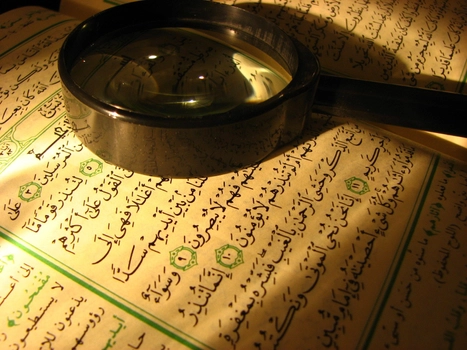
Picture source: FreeImages
Gold is one of the most coveted and precious materials in human history. Its significance is not limited to its physical properties but extends into cultural, spiritual, and religious contexts. The word gold itself in Arabic is called "ذهب". As unique as its sound, gold itself is mentioned in various instances, symbolizing not only wealth and materialism but also deeper moral and spiritual lessons. Let's explore in detail the lessons from the quranic verses related to gold.
Gold as a Symbol of Wealth and Worldly Desire
Gold is frequently associated with wealth and material abundance in the Quran. The verse in Surah Al-Imran (3:91) highlights the consequences for disbelievers in the day of judgement where not a single soul will accept gold in exchange for help, indicating gold is just a wordly desires:
"Indeed, those who disbelieve and die while they are disbelievers, never would the whole amount of the earth’s gold be accepted from one of them if he would seek to ransom himself with it. Those will have a painful punishment, and they will have no helpers."
Furthermore, gold is sometimes portrayed as a symbol of temptation and pride. In Surah Al-Imran (3:14), it is mentioned as part of a broader list of worldly desires:
"Beautified for people is the love of that which they desire—[the love of] women and sons, heaped-up sums of gold and silver, branded horses, cattle, and land. That is the enjoyment of worldly life. But Allah has with Him the best return."
Here, gold is part of the material desires that distract people from the higher spiritual goals and the ultimate reward in the afterlife. The Quran warns that the love for such things can prevent one from focusing on spiritual growth and submission to the will of Allah.
Gold in the Context of Paradise
In the Quran, gold also symbolizes the eternal rewards in Paradise. Believers who follow the righteous path are promised rewards beyond human comprehension, where gold is a recurring motif. In Surah Al-Kahf (18:31), it is stated:
"For them will be Gardens of Eternity; beneath them rivers will flow; they will be adorned therein with bracelets of gold, and they will wear green garments of fine silk and heavy brocade. They will recline therein on raised thrones. How good the recompense! How beautiful a couch to recline on!"
The description of Paradise includes references to gardens, rivers, and gold, symbolizing the eternal and sublime nature of the reward that awaits the righteous. In another verse, Surah Al-Hajj (22:23), Allah promises that those who believe will enter Paradise, where they will be adorned with gold:
"Allah will admit those who believe and work righteous deeds, to Gardens beneath which rivers flow: they shall be adorned therein with bracelets of gold and pearls; and their garments there will be of silk."
Again in Surah Faatir (35:33), the rewards of gold was mentioned for the residents of paradise:
"Gardens of Eternity will they enter: therein will they be adorned with bracelets of gold and pearls; and their garments there will be of silk."
Gold as a Test of Character
The Quran also uses gold to convey the notion of a test or trial for human beings. Wealth, including gold, is viewed as a test from Allah to see how individuals will use it. For instance, in Surah At-Tawbah (9:34), it states:
"O you who have believed, indeed, many of the rabbis and the monks consume the wealth of people unjustly and avert [them] from the way of Allah. And those who hoard gold and silver and spend it not in the way of Allah, give them tidings of a painful punishment."
This verse highlights the negative consequences of hoarding wealth, especially gold and silver, without using it for righteous causes. The Quran condemns the greed for material wealth and calls upon believers to be generous, using their wealth to support the poor and needy and to further the cause of justice.
Gold as a Symbol of High Status
Surah Az-Zukhruf (43:53) presents a rhetorical question that is directed at the Prophet Muhammad (PBUH) from the perspective of disbelievers who demanded signs to validate his prophethood as they expected someone who claimed divine authority and gold as a symbol of higher status. The verse reads:
"Then why are not gold bracelets bestowed on him, or (why) come (not) with him angels accompanying him in procession?"
This verse in Surah Az-Zukhruf, then, can be interpreted as a lesson about the difference between worldly measures of success and the higher, spiritual qualities that Allah values. It reminds believers that the Prophet's legitimacy does not come from material signs like gold or divine spectacles. His message is divine, and his virtue is based on the truth of his teachings and his connection to Allah—not on external symbols of wealth.
Conclusion
Gold in the Quran is a multi-faceted symbol. While it represents wealth and material temptation, it also serves as a reminder of the transient nature of worldly desires. It calls believers to reflect on their priorities and consider how they can use their wealth to serve Allah and others, not using it as a symbol of power or as a higher status in society. Ultimately, the Quran teaches that the true value of gold lies not in its accumulation but in how it is used as a tool for good, a test of character, and a symbol of the eternal rewards awaiting the righteous. Through these lessons, gold becomes more than just a precious metal—it becomes a metaphor for the choices one makes in life and the consequences of those choices in the hereafter.